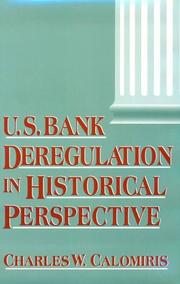| Listing 1 - 10 of 186 | << page >> |
Sort by
|
Book
Year: 2009 Publisher: Cambridge, Mass. National Bureau of Economic Research
Abstract | Keywords | Export | Availability | Bookmark
 Loading...
Loading...Choose an application
- Reference Manager
- EndNote
- RefWorks (Direct export to RefWorks)
Book
Year: 2009 Publisher: Cambridge, Mass. National Bureau of Economic Research
Abstract | Keywords | Export | Availability | Bookmark
 Loading...
Loading...Choose an application
- Reference Manager
- EndNote
- RefWorks (Direct export to RefWorks)
Book
Year: 2008 Publisher: Cambridge, Mass. National Bureau of Economic Research
Abstract | Keywords | Export | Availability | Bookmark
 Loading...
Loading...Choose an application
- Reference Manager
- EndNote
- RefWorks (Direct export to RefWorks)
Book
Year: 2008 Publisher: Cambridge, Mass. National Bureau of Economic Research
Abstract | Keywords | Export | Availability | Bookmark
 Loading...
Loading...Choose an application
- Reference Manager
- EndNote
- RefWorks (Direct export to RefWorks)
Book
Year: 2006 Publisher: Cambridge, Mass. National Bureau of Economic Research
Abstract | Keywords | Export | Availability | Bookmark
 Loading...
Loading...Choose an application
- Reference Manager
- EndNote
- RefWorks (Direct export to RefWorks)
Book
Year: 2006 Publisher: Cambridge, Mass. National Bureau of Economic Research
Abstract | Keywords | Export | Availability | Bookmark
 Loading...
Loading...Choose an application
- Reference Manager
- EndNote
- RefWorks (Direct export to RefWorks)
Book
Year: 2003 Publisher: Cambridge, Mass. National Bureau of Economic Research
Abstract | Keywords | Export | Availability | Bookmark
 Loading...
Loading...Choose an application
- Reference Manager
- EndNote
- RefWorks (Direct export to RefWorks)
Digital
Year: 2009 Publisher: Cambridge, Mass National Bureau of Economic Research
Abstract | Keywords | Export | Availability | Bookmark
 Loading...
Loading...Choose an application
- Reference Manager
- EndNote
- RefWorks (Direct export to RefWorks)
When and why do banking crises occur? Banking crises properly defined consist either of panics or waves of costly bank failures. These phenomena were rare historically compared to the present. A historical analysis of the two phenomena (panics and waves of failures) reveals that they do not always coincide, are not random events, cannot be seen as the inevitable result of human nature or the liquidity transforming structure of bank balance sheets, and do not typically accompany business cycles or monetary policy errors. Rather, risk-inviting microeconomic rules of the banking game that are established by government have always been the key additional necessary condition to producing a propensity for banking distress, whether in the form of a high propensity for banking panics or a high propensity for waves of bank failures. Some risk-inviting rules took the form of visible subsidies for risk taking, as in the historical state-level deposit insurance systems in the U.S., Argentina's government guarantees for mortgages in the 1880s, Australia's government subsidization of real estate development prior to 1893, the Bank of England's discounting of paper at low interest rates prior to 1858, and the expansion of government-sponsored deposit insurance and other bank safety net programs throughout the world in the past three decades, including the generous government subsidization of subprime mortgage risk taking in the U.S. leading up to the recent crisis. Other risk-inviting rules historically have involved government-imposed structural constraints on banks, which include entry restrictions like unit banking laws that constrain competition, prevent diversification of risk, and limit the ability to deal with shocks. Another destabilizing rule of the banking game is the absence of a properly structured central bank to act as a lender of last resort to reduce liquidity risk without spurring moral hazard. Regulatory policy often responds to banking crises, but not always wisely. The British response to the Panic of 1857 is an example of effective learning, which put an end to the subsidization of risk through reforms to Bank of England policies in the bills market. Counterproductive responses to crises include the decision in the U.S. not to retain its early central banks, which reflected misunderstandings about their contributions to financial instability in 1819 and 1825, and the adoption of deposit insurance in 1933, which reflected the political capture of regulatory reform.
Digital
Year: 2006 Publisher: Cambridge, Mass. NBER
Abstract | Keywords | Export | Availability | Bookmark
 Loading...
Loading...Choose an application
- Reference Manager
- EndNote
- RefWorks (Direct export to RefWorks)

ISBN: 0511528566 0521583624 0521028388 Year: 2000 Publisher: Cambridge : Cambridge University Press,
Abstract | Keywords | Export | Availability | Bookmark
 Loading...
Loading...Choose an application
- Reference Manager
- EndNote
- RefWorks (Direct export to RefWorks)
This book shows how and why deregulation has transformed the size, structure and geographic range of US banks, the scope of banking services, and the nature of bank-customer relationships. Over recent decades the characteristics that had made American banks different - the fragmented geographical structure of the industry, which restricted the scale of banks and their ability to compete with one another, and strict limits on the kinds of products and services commercial banks could offer - have virtually been eliminated. Understanding the origins and persistence of the unique banking regulations that defined US banking for over a century lends an important perspective on the economic and political causes and consequences of the current process of deregulation. History helps to define the political constituencies for and against deregulation, the political process through which bank regulations are determined, and the way deregulation is likely to affect future bank performance and stability.
Banks and banking --- Banking law --- Financial institutions --- Agricultural banks --- Banking --- Banking industry --- Commercial banks --- Depository institutions --- Finance --- Money --- Deregulation --- Business, Economy and Management --- Economics
| Listing 1 - 10 of 186 | << page >> |
Sort by
|

 Search
Search Feedback
Feedback About
About Help
Help News
News